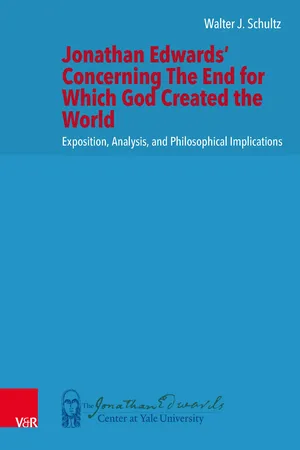
Jonathan Edwards' Concerning The End for Which God Created the World
Exposition, Analysis, and Philosophical Implications
- 351 pages
- English
- PDF
- Available on iOS & Android
Jonathan Edwards' Concerning The End for Which God Created the World
Exposition, Analysis, and Philosophical Implications
About this book
This book is an exposition of Jonathan Edwards' argumentation in his dissertation Concerning the End for Which God Created the World. In addition to stating Edwards' theses regarding God's end and motivation in creation, this book identifies and discusses the assumptions of his argumentation, analyses and explains its crucial components, and explores its philosophical implications. These implications include a version of exemplarism (i.e., the nature of God's ideas for creation), dispositionalism (i.e., the characteristics of God which explain God's motivation), and emanationism (i.e., what God shares of himself with persons who have a living faith in Christ). These entail a view of idealism (i.e., a view of the ultimate ontological ground of the universe), God's temporal nature, continuous creationism (i.e., how God sustains creation), a version of panentheism (i.e., how God, who is infinite, is related to creation, from which God is absolutely distinct), and occasionalism (i.e., the nature of causation of physical events or states of creation). These concepts and what they entail constitute a complete metaphysical system, providing a thoroughgoing divine action understanding of the foundation of reality. For Jonathan Edwards, God's acting according to his plans for his purposes in Christ is fundamental to all things. Were we to have an understanding of how the fundamental concepts of science, mathematics, and ordinary experience are related in reality to the God who acts for his original ultimate end in creation, sustaining the universe, while providentially guiding its affairs, and working redemption, we would have the opportunity to develop these as he had hoped, he pointed the way for others to follow.
Frequently asked questions
- Essential is ideal for learners and professionals who enjoy exploring a wide range of subjects. Access the Essential Library with 800,000+ trusted titles and best-sellers across business, personal growth, and the humanities. Includes unlimited reading time and Standard Read Aloud voice.
- Complete: Perfect for advanced learners and researchers needing full, unrestricted access. Unlock 1.4M+ books across hundreds of subjects, including academic and specialized titles. The Complete Plan also includes advanced features like Premium Read Aloud and Research Assistant.
Please note we cannot support devices running on iOS 13 and Android 7 or earlier. Learn more about using the app.
Information
Table of contents
- Title Page
- Copyright
- Acknowledgements
- Table of Contents
- Body
- Preface
- Summary of Chapters
- PART ONE Exposition and Analysis
- Chapter One Background to End of Creation
- Chapter Two God’s End in Creation is an “Original Ultimate End”
- Chapter Three The Master Argument in Fifteen Propositions
- Chapter Four God’s End in Creation Must Manifest God’s Supreme Self-Regard
- Chapter Five A Moral Justification of God: On the Use of a Fictitious Third Being
- Chapter Six Is Jonathan Edwards a Neo-Platonist? Edwards’ Use of “Emanation”
- Chapter Seven A Solution to The Divine Self-Sufficiency / Divine Action Problem
- PART TWO Philosophical Implications
- Chapter Eight The Origin of Possibility is God’s Ability ad extra
- Chapter Nine The Logical Necessity of Idealism
- Chapter Ten On God’s Freedom in Creation
- Chapter Eleven Continuous Creationism, Occasionalism, and Panentheism
- Chapter Twelve Divine Action and the Persistence of Physical Objects
- APPENDIX A: Outline of The End for Which God Created the World
- APPENDIX B: A Synopsis of the Argumentation in End of Creation
- APPENDIX C: A Logical Analysis of Edwards’ Argumentation
- APPENDIX D: Four Criteria in Edwards’ Six-Stage Argument
- APPENDIX E: On Behalf of Edwards’ Complete Representation Exemplarism
- APPENDIX F: Edwards on God’s being metaphysically temporal
- References
- Person Index
- Subject Index